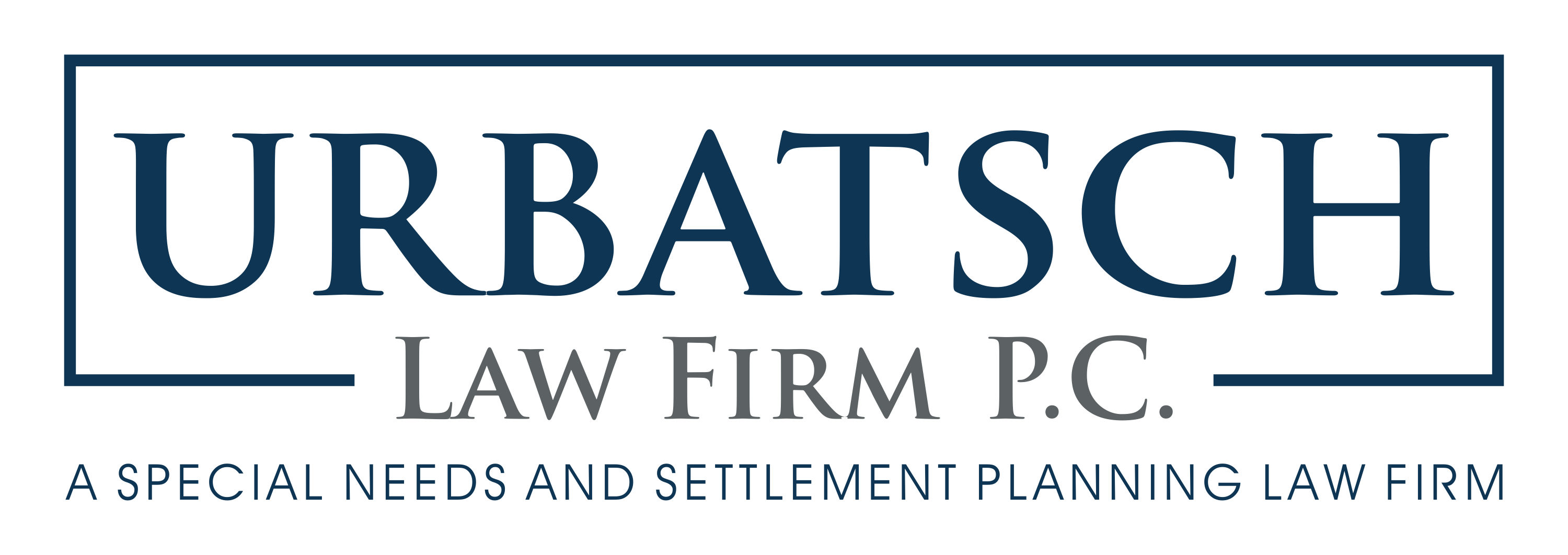The Urbatsch Law Firm P.C. provides comprehensive special needs and settlement planning from the nation’s leading experts.
How we can help
- Special Needs Planning
- Settlement Planning
- First Party Special Needs Trusts (aka (d)(4)(A) SNT or Pooled SNT)
- Minor's Settlement Trust (aka 3611(g) Trust)
- Estate Planning
- Elder Law/Medi-Cal Planning
- Probate
- Trust Administration
- Conservatorship/Guardianship
 Special needs planning is a specialized area of the law that focuses on protecting public benefits for people with special needs, while at the same time facilitating a higher quality of life. A special needs plan can provide a framework for proper medical care and management of assets, as well as protect assets from creditors and predators. One of the key components of any special needs plan is a Special Needs Trust.
Special needs planning is a specialized area of the law that focuses on protecting public benefits for people with special needs, while at the same time facilitating a higher quality of life. A special needs plan can provide a framework for proper medical care and management of assets, as well as protect assets from creditors and predators. One of the key components of any special needs plan is a Special Needs Trust.
Where there are a number of different types of Special Needs Trusts available, in California, the two most common in are First Party Trusts and Third Party Trusts.
First Party Special Needs Trusts must be set up by a parent, grandparent, legal guardian, or the Court for the sole benefit of a person with special needs. The Trust must be established with money owned by the person with a disability. First Party Special Needs Trusts are subject to the payback provision, which means that when the beneficiary dies, the trustee must use any remaining trust assets to repay the state of California for all benefits provided by the state to the special needs beneficiary.
Third Party Special Needs Trusts are funded with assets of someone other than the beneficiary. They are the most common and effective way for parents to provide for a child with a disability, and they are not subject to the payback provision. Typically, Third Party Trusts are established through a Revocable Living Trust or as a Stand-Alone Trust. It can also be established through a Will. Benefits of a Third Party Trust include:
No requirement that the state of California be paid back
Trust provisions can be flexible and drafted in accordance with your wishes and desires for the beneficiary, within the guidelines allowed by law
Trustees and successors know what to expect and can prepare/train accordingly
If laws change, the trust can be amended
Ensures that trust assets stay in the family
Can include special provisions such as a Care Manager, specific types of distributions and authorization for the trust to be terminated if the beneficiary is no longer disabled or in need of government benefits
Improved quality of life
A Special Needs Trust gives the beneficiary indirect access to a fund that can provide for his or her supplemental needs. This can dramatically improve the beneficiary’s quality of life, by providing for:
Housing (although this may cause a reduction in benefits)
Food (distributions for food may also cause a reduction in benefits)
Clothing
Household furnishings
Utilities
Educational expenses
Insurance
Musical instruments
Medical procedures or therapies not available through government assistance
Medications (not covered by benefits)
Supplemental nursing home care and private companion services
Geriatric care services
Travel expenses
Entertainment expenses such as movies, concerts or electronic equipment
An automobile
Attorney fees
Other expenses, services or products not provided by a government assistance program
Additional benefits of a Special Needs Trust include:
Freedom of choice
The beneficiary can use his or her Medi-Cal benefits and trust distributions to pay for medical services not provided by Medi-Cal, or for a specialist who does not accept Medi-Cal payments.
Avoiding Conservatorship
In addition to preserving eligibility for government assistance, a Special Needs Trust can save the beneficiary from paying for the ongoing costs and formalities of maintaining a court-supervised conservatorship.
 A settlement or judgment received by a person with a disability or a minor requires special planning. If the person with a disability receives a settlement, it could cause that person to lose certain essential public benefits. Often, the award will be exhausted quickly to pay for medical expenses that otherwise would have been paid by Medi-Cal. The person would then have no other means of support. The solution to this dilemma is to create a custom plan that takes into account the Plaintiff’s unique needs to achieve their post-settlement goals
A settlement or judgment received by a person with a disability or a minor requires special planning. If the person with a disability receives a settlement, it could cause that person to lose certain essential public benefits. Often, the award will be exhausted quickly to pay for medical expenses that otherwise would have been paid by Medi-Cal. The person would then have no other means of support. The solution to this dilemma is to create a custom plan that takes into account the Plaintiff’s unique needs to achieve their post-settlement goals
 A plaintiff who is disabled and receiving needs-based public benefits requires special planning when he or she receives a settlement or judgment. Failing to plan can lead to great hardship for the client and may lead to a malpractice claim against the plaintiff ’s attorney. Primarily, this planning is done by transferring the litigation recovery to a first party Special Needs Trust (SNT). This type of trust allows a person with a disability to use the litigation recovery for his or her future needs while preserving eligibility for needs-based public benefits.
A plaintiff who is disabled and receiving needs-based public benefits requires special planning when he or she receives a settlement or judgment. Failing to plan can lead to great hardship for the client and may lead to a malpractice claim against the plaintiff ’s attorney. Primarily, this planning is done by transferring the litigation recovery to a first party Special Needs Trust (SNT). This type of trust allows a person with a disability to use the litigation recovery for his or her future needs while preserving eligibility for needs-based public benefits.
First-party SNTs are statutorily created “safe harbor” trusts. Therefore, every first-party SNT must strictly comply with a myriad of federal, state, administrative and judicial rules and regulations defining them. Even small changes in a plaintiff ’s fact pattern (e.g., plaintiff ’s age, legal capacity or amount of recovery) can lead to a very different planning solution. Thus, it is imperative for the practitioner to understand the law in this area and how different factual situations will change the appropriate plan. We can help navigate through these difficult waters to make sure that the plaintiff receives the best possible plan.
A first-party SNT is a trust authorized by federal law. The purpose of a SNT is to allow an individual with a disability to receive the benefit of their personal injury award while preserving their right to receive their essential “needs-based” public benefits. Primarily, the benefits at issue are Medi-Cal and Supplemental Security Income (SSI). Moreover, the SNT can provide expert money management by a professional money manager and provide appropriate care for the individual with a disability utilizing care managers, if appropriate.
Requirements for Special Needs Trust eligibility include:
The SNT must be funded with assets of the person
The person must be under 65 years of age at the time the SNT is funded
The person must be disabled
The SNT must be for the “sole benefit” of the person with a disability
The SNT must be established by a parent, grandparent, legal guardian, or a Court
Upon the death of the person with a disability, Medi-Cal must be repaid for benefits paid during the individual’s lifetime
Kevin Urbatsch regularly speaks nationally to accountant, attorney and business groups, and he has published many articles on special needs trust.
For articles we have written about settling a person with a disability’s lawsuit, see: “Special Needs Trusts: Protect Your Child’s Financial Future, 4th Edition” Nolo Press (April 2011)
 Settling a minor’s complaint adds a level of complexity to a lawsuit that can be daunting to even experienced practitioners. Those attorneys who resolve a minor’s lawsuit must comply with legal procedures designed to protect the minor. These procedures trigger court-imposed protections from settlement terms not in the minor’s best interest and protections against mismanagement of the minor’s settlement proceeds. The primary legal authority for resolving a minor’s lawsuit is found in Probate Code §§3500, 3600-3613. These statutes provide the framework on how to properly file the pleadings to compromise the minor’s claim.
Settling a minor’s complaint adds a level of complexity to a lawsuit that can be daunting to even experienced practitioners. Those attorneys who resolve a minor’s lawsuit must comply with legal procedures designed to protect the minor. These procedures trigger court-imposed protections from settlement terms not in the minor’s best interest and protections against mismanagement of the minor’s settlement proceeds. The primary legal authority for resolving a minor’s lawsuit is found in Probate Code §§3500, 3600-3613. These statutes provide the framework on how to properly file the pleadings to compromise the minor’s claim.
Minor’s settlement trusts are an excellent tool for managing a minor’s settlement when public benefits are not an issue but assets are needed prior to the minor turning age 18. These trusts are useful in many cases to avoid rapid dissipation of the settlement when the minor turns age 18, when funds must be distributed to the young adult. We draft minor’s settlement trusts specifically tailored to meet a minor victim’s needs and goals.
A properly designed and implemented estate plan can also help you accomplish a number of more ambitious goals, such as:
- Protect your hard-earned assets
- Allow you and your family can continue to enjoy the lifestyle to which you have become accustomed
- Pass your values, sense of responsibility and work ethic to heirs
- Significantly reducing income, estate, excise, and generation skipping taxes
- Keep your affairs private
- Protect your heirs’ inheritances if they are not yet mature enough to make responsible decisions on their own
- Provide for your impact on society and legacy
We help a wide range of individuals and families, people of modest means to those of high net worth, achieve their estate planning goals. We offer all of the following services and more:
Foundational Estate Planning
- Revocable Living Trusts
- Wills
- Powers of Attorney
- Advance Health Care Directives
- HIPAA Authorizations
- and Related Documents
Elder law focuses on helping seniors prepare for and cope with the changes that come with growing older. It often involves helping seniors and their families find ways to pay for long-term care without losing most if not all of their assets. When you consider that the majority of seniors will find themselves in a nursing home at some point in their lives, Medicare will not pay for long-term nursing home care, and the cost of such care in California averages around $8,000 per month, it is not surprising that many middle-class families lose their life savings within one year of moving into a nursing home.
Kevin Urbatsch is an experienced Medi-Cal planning attorneys, he design plans to help seniors prepare for disability and the need for long-term care in advance, as well as cope with what is known as a “Medi-Cal Crisis.”
Advanced planning
Long-term care insurance is one way to protect assets against the high cost of long-term medical care, but it is expensive, often carries high co-pays, and is difficult to qualify for when there are pre-existing medical conditions. Fortunately, there are other options available to protect your assets in advance against the cost of long-term care. We can explain these options to you and create a plan to ensure you receive the care you need without losing the assets you have worked a lifetime to achieve.
Medi-Cal planning
Medi-Cal is a joint federal-state program that has become a significant provider of funds for long-term care in the state of California. Before applying for assistance from Medi-Cal, it is a good idea to speak with an elder law attorney. Many people make mistakes in filling out the application, or do things such as giving away assets in the hopes of becoming eligible for Medi-Cal. While gifting is possible, it has to be done correctly. There are strict rules governing Medi-Cal eligibility, and making mistakes in your application or management of assets can lead to severe punishments, such as long delays in obtaining benefits or outright denial of benefits.
A Medi-Cal crisis
We recognize that it is not always possible to plan in advance for incapacity. A Medi-Cal crisis is a situation in which an individual must enter a nursing home immediately, or in the very near future, and has been informed that he or she has too many assets to qualify for Medi-Cal assistance. If you or a loved one is facing a Medi-cal crisis, you need to understand that the information provided by family and friends, social workers or even nursing home intake staff is often outdated or otherwise inaccurate. At the Urbatsch Law Firm, P.C., we have a thorough understanding of Medi-Cal law and years of experience helping seniors obtain the Medi-Cal assistance they need. We may also be able to help even if you have been denied benefits in the past or are living in a nursing home already. Contact us as soon as possible to schedule an initial consultation.
What is Probate?
If you have a Will or die without one, your estate will be subject to probate. Hiring an experienced lawyer from The Urbatsch Law Firm, P.C. may be one of the best decisions you can make to handle the probate.
Probate is the court-supervised process by which your estate is divided among your beneficiaries or heirs. During probate, the value of your estate is determined; your debts are paid; any taxes you owe, whether income or estate, are paid; and your property is distributed to the people you name in your Will. If you do not have a Will, your property passes through what is known as intestate succession. California provides “rules” by which property passes in this manner to your relatives. If you have a Will, the person that handles the probate of your estate is called the executor. If you do not have a Will, the person that handles the probate of your estate is known as the administrator and will typically be a family member.
Probate is a long process, typically taking over one year. In addition, it can be quite expensive as base probate fees are based on a percentage of the estate.
Is Probate Always Needed?
The size of the estate determines whether it will be probated. If the value of real property (land or home), including personal effects, exceeds $184,500 in 2022 (indexed annually for inflation), the estate will go through probate. If the estate is under the allowed limit, a simple affidavit procedure may be substituted for the lengthy and costly probate process.
Do all Assets go through Probate?
Not everything in a person’s estate automatically goes through probate. There are alternatives to probate. One is having a living trust. Another is a Spousal Property Petition, a procedure used by a surviving spouse to transfer all the deceased spouse’s property to the surviving spouse. Also, assets with valid named pay-on-death beneficiaries, such as insurance policies, IRA’s, and annuities, avoid probate as long as the beneficiary is alive.
What Happens in Probate?
The process depends on whether the deceased left a Will. If there is a Will (testate), and it names someone to be appointed as executor, then that person, usually with the
assistance of an attorney, petitions the court to be appointed executor and to admit the Will to probate. The notice must be given to persons named in the Will, all known creditors of the deceased, and the deceased natural heirs, including a legal publication in the local newspaper where the deceased was domiciled. If the deceased left no Will (intestate), an interested persons petitions the court to be appointed an administrator of the estate.
The executor or administrator must collect the assets of the estate that are subject to probate, pay debts and death taxes, and request court approval to transfer assets to the decedent’s heirs or the persons named in the will. The executor or administrator will prepare an inventory and appraisal, file tax returns, settle the creditor’s claims and then, finally, distribute the estate.
How Long Does it Take to Probate an Estate?
For most estates, the probate takes nine months to two years. The size and complexity of the estate determine the duration of the probate process. If there is a conflict between the heirs or the beneficiaries, the process can take even longer.
What Is the Cost Of Probate?
Two kinds of fees are paid by the estate; statutory and extraordinary fees. Statutory fees are established by the state legislature and are calculated as a percentage of the gross value of probate assets, plus income receipts and net gains on sale of assets during the probate administration.
The attorney and the personal representative are each entitled to statutory fees: 4% of the first $100,000, 3% of the second $100,000 and 2% of the next $800,000, 1% of amounts above $1,000,000. For example, the probate of a $600,000 estate entitles the attorney a fee of $15,000 and the executor earns a fee of $15,000. Therefore, the total statutory fee for a $600,000 comes to $30,000, excluding extraordinary fees.
Extraordinary fees are requested when the services rendered exceed those usually required in probate administration. An award of extraordinary compensation to the personal representative or to the attorney for the personal representative is within the discretion of the court.
What Are the Advantages of a Probate Proceeding?
The advantages of a probate proceeding are that the court protects the heirs and beneficiaries. A probate proceeding cuts off the claims of creditors and clears the title to the property. In addition, questions and disputes are settled under the court’s jurisdiction.
What are the Disadvantages of a Probate Proceeding?
The disadvantages of a probate proceeding are that it is costly, time-consuming, and lengthy. Probate proceedings, as court proceedings, are inherently inflexible because the court controls the process. All probate transactions are a matter of public record; therefore, there is also a lack of privacy.
Is There an Alternative to Probate?
The expense and duration of probate is the reason many people execute living trusts. A living trust is a way to protect one’s heirs and beneficiaries from the cost, stress, and time lost in probate court. Most people want to consider ways to avoid probate and yet ensure that their assets are protected for their family and beneficiaries by creating a trust. Administering a trust should be done with the help of an attorney to make sure all the estate assets are transferred into the trust properly and the intent of the trustor is carried out.
Trust administration is necessary whenever a trustee needs assistance in managing a trust. Let the experts at The Urbatsch Law Firm, P.C. assist you with the administration A trustee will have various duties and responsibilities required by California law. For example:
- A trustee must file complicated notices and comply with strict deadlines and timeframes while also managing the various assets in the trust.
- Send out a mandatory notice to all beneficiaries and heirs to allow them to contest the trust.
- Keep detailed trust accounting records.
- File the appropriate tax documents in a timely manner.
- Handle distributions in accordance with the terms of the trust.
- Protect assets and property while exercising diligence and skill when managing the estate until everything is distributed to the beneficiaries.
Being a trustee is a heavy legal responsibility, as the estate’s beneficiaries and the trust’s creator (often called the settlor or the grantor) will be counting on you. A trustee can also be held liable for any mistakes or violations in the duties of being a fiduciary. Still, all those issues can be avoided by obtaining the help of an experienced trust administration attorney. The loss of a loved one is always difficult. However, making the correct decisions and seeking the help of a professional will only make the aftermath of that loss easier to bear.
Understanding Conservatorship
Conservatorship is a legal proceeding in which the court evaluates the vulnerability of an adult who may be unable to take care of his or her own: needs for shelter, food, medical care, manage personal finances, or may be subject to undue influence. Hiring an experienced lawyer from The Urbatsch Law Firm, P.C. may be one of the best decisions you can make during this difficult or transitional stage of life for your loved one.
What is Conservatorship?
Conservatorship is a legal arrangement in which a court appoints a responsible person or organization to manage the affairs and make decisions on behalf of another person, typically someone unable to make such decisions due to incapacity or disability.
Conservatorship can be established for adults with disabilities, or elderly individuals who are no longer able to manage their own affairs. The appointed conservator is responsible for making decisions related to the person’s health care, financial affairs, and general welfare and must act in the best interest of the individual under their care.
Establishing conservatorship typically involves filing a petition with the court, providing evidence of the individual’s incapacity or disability, and attending a hearing where the court will determine whether a conservatorship is necessary and who the conservator should be. Conservatorship is a serious legal arrangement that involves significant responsibilities and obligations.
Conservatorship Laws in California
Conservatorship laws in California are governed by the California Probate Code. Here are some key provisions of California conservatorship laws:
- Types of conservatorship: California law provides for two types of conservatorships: conservatorship of the person and conservatorship of the estate. Conservatorship of the person involves making decisions related to the individual’s personal care and medical treatment, while conservatorship of the estate involves managing the individual’s finances.
- Establishing a conservatorship: A conservatorship can be established if a court finds that the individual is unable to provide for their own personal needs or manage their own finances due to a physical or mental condition.
- Appointment of conservator: The court will appoint a conservator to manage the affairs of the individual. The conservator is usually a family member, friend, or professional conservator.
- Duties of conservator: The conservator has a duty to act in the best interests of the individual and to manage their affairs with the highest degree of care. The conservator must also file regular reports with the court.
- Termination of conservatorship: A conservatorship can be terminated if the individual regains capacity, if the conservatorship is no longer necessary, or if the conservator is no longer capable or suitable.
- Rights of the individual: Individuals subject to conservatorship in California have certain rights, including the right to counsel, the right to receive notice of all court proceedings related to the conservatorship, and the right to request a hearing to challenge the conservatorship.
Overall, conservatorship laws in California are designed to protect the interests of individuals who cannot manage their own affairs due to physical or mental incapacity. A consultation with the attorneys at The Urbatsch Law Firm, P.C. can ensure that all legal requirements are met, and the individual’s best interests are protected.
Reasons to Establish a Conservatorship or Limited Conservatorship
There are several reasons why someone may need a conservatorship, including:
- Age-related disabilities: As people age, they may develop physical or cognitive disabilities that make it difficult for them to manage their own affairs. In such cases, a conservatorship may be necessary to ensure their financial and medical needs are met.
- Mental illness: Individuals with severe mental illnesses such as schizophrenia or bipolar disorder may struggle to make sound decisions and manage their own affairs. A conservatorship may be necessary to ensure they receive the care they need.
- Developmental disabilities: Individuals with developmental disabilities such as Down syndrome or autism may require assistance managing their affairs throughout their lives. A conservatorship may be necessary to ensure they receive the necessary care and support.
- Substance abuse: Individuals with substance abuse issues may not be able to manage their affairs while they are under the influence of drugs or alcohol. A conservatorship may be necessary to ensure they receive the care they need and to manage their finances.
Overall, a conservatorship is intended to protect the individual’s best interests and ensure they receive the care and support they need. It is an important legal tool that can provide peace of mind to both the individual and their loved ones.
Reasons to Terminate a Conservatorship
There may be situations where a conservatorship is no longer necessary or appropriate, and terminating the conservatorship may be in the best interests of the individual. Here are some common reasons to terminate a conservatorship:
- The individual has regained capacity: If the individual has recovered their capacity to manage their own affairs, the conservatorship may no longer be necessary.
- The conservatorship is no longer needed: If the individual’s condition has improved or their needs have changed, the conservatorship may no longer be necessary.
- The conservator is no longer capable or suitable: If the conservator is no longer capable of fulfilling their duties or is not acting in the best interests of the individual, the conservatorship may need to be terminated.
- The conservatorship is causing harm: If the conservatorship is causing harm to the individual, such as through financial exploitation or abuse, the conservatorship may need to be terminated.
- The individual wishes to terminate the conservatorship: If the individual expresses a desire to terminate the conservatorship, the court may consider this as a factor in deciding whether to terminate the conservatorship.
In general, termination of a conservatorship requires a court order, and the process can be complex. It is important to have a skilled conservatorship lawyer to protect your rights at every step.
How Long will I be a Conservator?
The limited conservatorship lasts for the lifetime of the conservatee or the lifetime of the conservator (whichever is shorter) unless the court orders otherwise. Also, if a court investigator’s report or other information suggests a conservator is not acting in the best interests of the conservatee, the judge will issue an order to show cause. If this happens, there will be a court hearing to decide if the conservator should be removed and replaced.
This is not a criminal hearing, but, if a conservator is suspected of taking physical or financial advantage of a conservatee, the State can file criminal charges.
What is a Limited Conservatorship?
In general, the purpose of a limited conservatorship is to protect adults with developmental disabilities from harm or exploitation while allowing for maximum self-reliance and independence.
Upon attaining the age of 18, a child will be considered a legal adult, gaining the authority to make his or her own life decisions regardless of any cognitive or developmental disability. A parent will no longer have the legal authority to make decisions for his or her child regarding health care, education, and finances unless a limited conservatorship is established.
A limited conservatorship is established through a court proceeding, where the judge will grant an individual or individuals (called a conservator) legal responsibility for the individual with a developmental disability (called a conservatee).
There are two types of limited conservatorships:
- A limited conservatorship of the person is where a conservator cares for and protects the conservatee and provides for the conservatee’s needs associated with daily life.
- A limited conservatorship of the estate is where a conservator handles the conservatee’s financial matters, such as paying bills and managing investments, if the conservatee has an estate.
Do I Need a Limited Conservatorship of the Estate?
You do not need a conservatorship of the estate if:
- the developmentally disabled adult you care for gets public assistance, like Supplemental Security Income (SSI) or Social Security (SSA) but has no other assets, or
- the developmentally disabled adult earns a wage.
Who Decides if the Adult is Developmentally Disabled?
The Regional Center in your community will test the proposed conservatee to see if she/he is developmentally disabled. If the Regional Center accepted the person as a consumer (or client) before age eighteen (18), then she/he automatically qualifies as a person with a developmental disability. But, if the person has never been tested or accepted as a regional center consumer, she/he must be tested.
To be an eligible developmental disability, the disability must have originated before the age of 18, be likely to continue indefinitely, and constitute a substantial handicap. The eligible conditions are mental retardation, cerebral palsy, epilepsy, autism and the “fifth category”. (See the Regional Center for more information on this category).
Conditions are solely psychiatric disorders, solely learning disabilities, or solely physical in nature are specifically excluded.
If the Regional Center feels that an individual does not qualify as a person with a developmental disability, and you disagree, you can appeal to the Area Board in your region (created by the state legislature to advocate for the rights of individuals with developmental disabilities).
Who can be Appointed as Limited Conservator?
Any adult can file for conservatorship. Conservators are usually parents, sisters, or brothers, but any responsible adult can act as conservator. There can be more than one limited conservator.
What Kind of Decisions can a Limited Conservator Make?
A limited conservator’s duty is to help the limited conservatee develop maximum self-reliance and independence. Because developmentally disabled adults can usually do many things independently, the judge will only give the limited conservator power to do things the conservatee cannot do without help.
After the hearing, the limited conservator’s “Letters of Conservatorship” and the “Order Appointing Probate Conservator” will list the exact areas (powers) in which the limited conservator is authorized to act.
What are the Responsibilities of a Limited Conservator?
As a limited conservator of the person, you must take care of the conservatee’s:
- Food
- Clothing
- Shelter
- Well-being
Powers
What Powers Can A Limited Conservator Ask For?
A limited conservator may ask the court for the following seven (7) powers:
- To fix the conservatee’s residence or dwelling
- To have access to the conservatee’s confidential records or papers
- To consent or withhold consent to the conservatee’s marriage
- To control the right of the conservatee to enter into contracts
- To give or withhold medical consent on behalf of the conservatee
- To restrict the conservatee’s social and sexual contacts and relationships
- To make all decisions concerning the education of the conservatee
When to Apply
When Should I Apply for Limited Conservatorship?
It is best to start the process about six months before the person’s 18th birthday. Once the paperwork is filed with the court, it can take 10-12 weeks or longer for the court to process the paperwork. The conservatorship will be effective upon the conservatee’s 18th birthday. However, a limited conservatorship can be established at any time after the person with the developmental disability has attained the age of 18.





